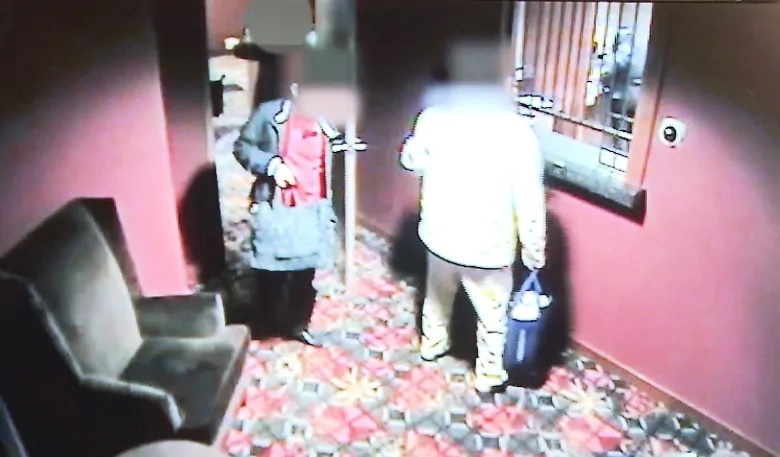- Money Laundering At Casinos
- Money Laundering At Indian Casinos Video
- Money Laundering At Indian Casinos In America
- Trump Casino Money Laundering
- Money Laundering At Indian Casinos List
- Types Of Money Laundering
The Bush-DeLay-Indian Casinos Trail of Mirrors Campaign Money Laundering Operation. Congressman Tom DeLay, a.k.a. The Hammer, has been at the center of two investigations recently by the House. By Cristina Maza On 11/17/17 at 11:17 AM EST. Trump Corruption. President Donald Trump made tens of millions of dollars in profits by allowing Colombian drug cartels and other groups to.
Money laundering is a common problem all over the world. The legalization of crime revenues has many damages and negative effects. Financial crimes cause the administrative order to deteriorate and economic stability will deteriorate. Governments have taken specific measures from the past to prevent money laundering. The purpose of these measures is to prevent financial crimes and ensure the administrative and economic stability of the country.
Overview of AML in India
India is among the high-risk areas for money laundering. Therefore, the Indian government needs to take Anti-Money Laundering measures together with their developing economies. Failure to take the necessary measures increases money laundering crimes in India and undermines India's reputation in the international arena.
The Indian government has been aware of the risks posed by money laundering from the past to the present. The governments of India aim to protect their country from money laundering risks through laws and legal mechanisms. India enacted thePrevention of Money Laundering Act in 2002. The laws and regulations prior to this law were insufficient to combat money laundering. The Prevention of Money Laundering Act has entered into force to combat money laundering and to prevent money laundering. In addition, India is among the countries that are members of FATF. FATF is a global organization established to prevent money laundering all over the world. By publishing AML guidelines, FATF aims for countries to fight financial crime more effectively. The FATF member states' AML regimes must comply with FATF recommendations.
Which Sectors have to ensure AML compliance?
In line with the Prevention of Money Laundering Act, the banking industry, financial institutions, financial service providers, gaming businesses and casinos have to ensure AML compliance. These organizations must implement customer due diligence requirements during the customer onboarding phase. Customer due diligence helps determine the customer's risk level. In addition, these organizations must record and retain customer information. These organizations have to conduct AML checks, detect suspicious transactions of customers, and report to authorized units.
Anti-Money Laundering Regulators in India
Financial Intelligence Unit - India (FIU-IND)
The Financial Intelligence Unit of India (FIU-IND) was established in 2004 by the Indian government to review and analyze suspicious financial transactions. The Financial Intelligence Unit of India (FIU-IND) is the organization responsible for the fight against the financial crimes of India under the Ministry of Finance. Businesses with AML obligations report to the Financial Intelligence Unit.
Reserve Bank of India (RBI)
Reserve Bank of India is the central bank of the Republic of India. It is responsible for the economic growth and economic stability of India. However, it also has some regulatory powers to prevent money laundering.

Money Laundering Penalties in India
The money laundering crime in India has huge penalties. According to AML laws in India, people committing money laundering offenses are sentenced to up to 10 years in prison. Financial institutions in India have to meet AML obligations. Administrative and fines are imposed on financial institutions that do not comply with AML compliance.
Anti-Money Laundering Solutions for India
Money Laundering At Casinos
Sanction Scanner is an AI-driven Anti-Money Laundering compliance software. Organizations can ensure AML compliance with our AML solutions. You can contact us to ensure your business's AML compliance.
Money Laundering At Indian Casinos Video
Ensure AML Compliance!
Perform AML Screening in real-time and global coverage of PEP, Sanctions, and Watchlist Data.
By a Biometrica Staffer

Every now and then, on Tuesdays, we’ll delve into the rather arcane world of casino regulations and compliance, look at some of the more frequently asked questions that apparently come up with the Financial Crimes Enforcement Network (FinCEN), and attempt to get to the gist of their answers, so you don’t have to. For instance, two weeks ago, we looked at Suspicious Activity Reports (SARs) filed by casinos in Q1 2021, to determine if the world of American gaming was trending back to business.
Money Laundering At Indian Casinos In America
This time, we thought we’d look at the basics of what you need to know when you’re dealing with the BSA. First, though, if you’re wondering what the BSA is, it’s the Bank Secrecy Act.
Yes, but what exactly is the BSA all about?
In 1970, the United States Congress passed the Currency and Foreign Transactions Reporting Act, now called the Bank Secrecy Act. It required financial institutions in the U.S. to help government agencies identify and prevent money laundering, with a specific focus on the recording and reporting of cash purchases of things like bank notes, checks, demand drafts etcetera (collectively referred to as negotiable instruments) of more than $10,000 (as a daily aggregate amount). Institutions were also required to report any suspicious activity that might be indicative of money laundering, tax evasion, or other criminal transactions or events.
Got it, but how does it all work?
The FinCEN administers the BSA, which requires depository institutions and other industries vulnerable to money laundering to take several precautions against financial crime. This includes filing and reporting certain data about financial transactions that might possibly indicate money laundering. In fiscal year 2019, more than 20 million BSA reports were filed by more than 97,000 U.S. financial institutions, providing potentially useful information to agencies focused on detecting and preventing money laundering, other financial crimes, and terrorism. According to FinCEN, just filing these reports is a major deterrent to money laundering, if they’re accessible to law enforcement, counter-terrorism agencies, financial regulators, and the intelligence community.
What does this have to do with casinos? They’re not banks.
No, but they deal in financial transactions. Remember Casino, the movie? It was based on a fictionalized account of the time the Italian mob, or more specifically, the Chicago Outfit, skimmed money from a bunch of Las Vegas casinos. Businessman and gangster Al Capone, who was finally jailed in 1931 — not for running illegal gambling rackets or prostitution rings or murder, but for tax evasion, incidentally — once led the Chicago Outfit. There’s perhaps a lesson there. In any case, several, if not most, casinos are considered non-bank financial institutions (NBFIs) under law.
Ok. But what are NBFIs?
Essentially NBFIs are institutions that aren’t banks or don’t have a banking license but do offer financial services or conduct financial transactions. The Federal Financial Institutions Examination Council (FFIEC) has a more complete definition here.
Are all casinos NBFIs?
Well, no. Most are, though.
Trump Casino Money Laundering
What do you mean by saying “most” casinos are considered NBFIs?
According to the IRS, casinos and card clubs licensed to do business as casinos or card clubs, which have Gross Annual Gaming Revenues (GAGR) of more than $1,000,000, are considered financial institutions subject to the requirements of the BSA, which is codified in part in what is known as Title 31 of the United States Code (USC). Under this, some financial institutions, and individuals (defined by the Secretary of the Treasury), are required to keep records and file reports on certain kinds of financial transactions. Which means they have to follow all reporting procedures under what’s called Title 31, or face the consequences of failure to report suspicious activity or a pattern of suspicious activity.
Are two separately licensed, but jointly owned tribal gaming operations, one of which is a bingo hall and the other offering casino games, both treated as casinos under the BSA regulations?
No. Here’s what the FinCEN has to say about this. If a tribal government issues two separate licenses, one for a tribal gaming operation that only offers traditional bingo, and one for a tribal gaming operation that offers casino games, then the one offering traditional bingo is not treated as a casino under BSA regulations, while the latter is treated as a casino. Joint ownership is not relevant to the determination. However, If the bingo hall engages in any of the activities described in 31 C.F.R. § 1010.100, then the bingo hall would qualify as a “money services business” under that provision and a “financial institution” under 31 C.F.R. § 1010.100 (subpart t).
What is a money services business (MSB)?

The term “money services business” includes any person (where the person could be an individual, a corporation, a partnership, a trust or estate, a joint stock company, an association, a syndicate, joint venture, or other unincorporated organization or group, an Indian Tribe — as that term is defined in the Indian Gaming Regulatory Act), and all entities cognizable as legal personalities doing business, whether or not on a regular basis or as an organized business concern, in one or more of the following capacities:
- Currency dealer or exchanger.
- Check casher.
- Issuer of traveler’s checks, money orders or stored value.
- Seller or redeemer of traveler’s checks, money orders or stored value.
- Money transmitter.
- U.S. Postal Service.
Money Laundering At Indian Casinos List
An activity threshold of greater than $1,000 per person per day in one or more transactions applies to the definitions of: currency dealer or exchanger; check casher; issuer of traveler’s checks, money orders or stored value; and seller or redeemer of travelers’ checks, money orders or stored value. The threshold applies separately to each activity — if the threshold is not met for the specific activity, the person engaged in that activity is not an MSB based on that activity. However, there is no activity threshold applied to the definition of “money transmitter.” Therefore, a person that engages as a business involved in the transfer of funds is an MSB as a money transmitter, regardless of the amount of money transmission activity. Each MSB is considered a financial institution.
Just a quick note here. As mentioned above, a casino or a card club that is duly licensed or authorized to do business as such and has gross annual gaming revenue more than $1 million, is subject to the requirements applicable to casinos and card clubs, even if a casino or card club does its own check cashing. A casino or a card club is not required to comply with rules specific to MSBs.
Types Of Money Laundering
Next time: Red flags for casinos when it comes to money laundering and terrorist financing.